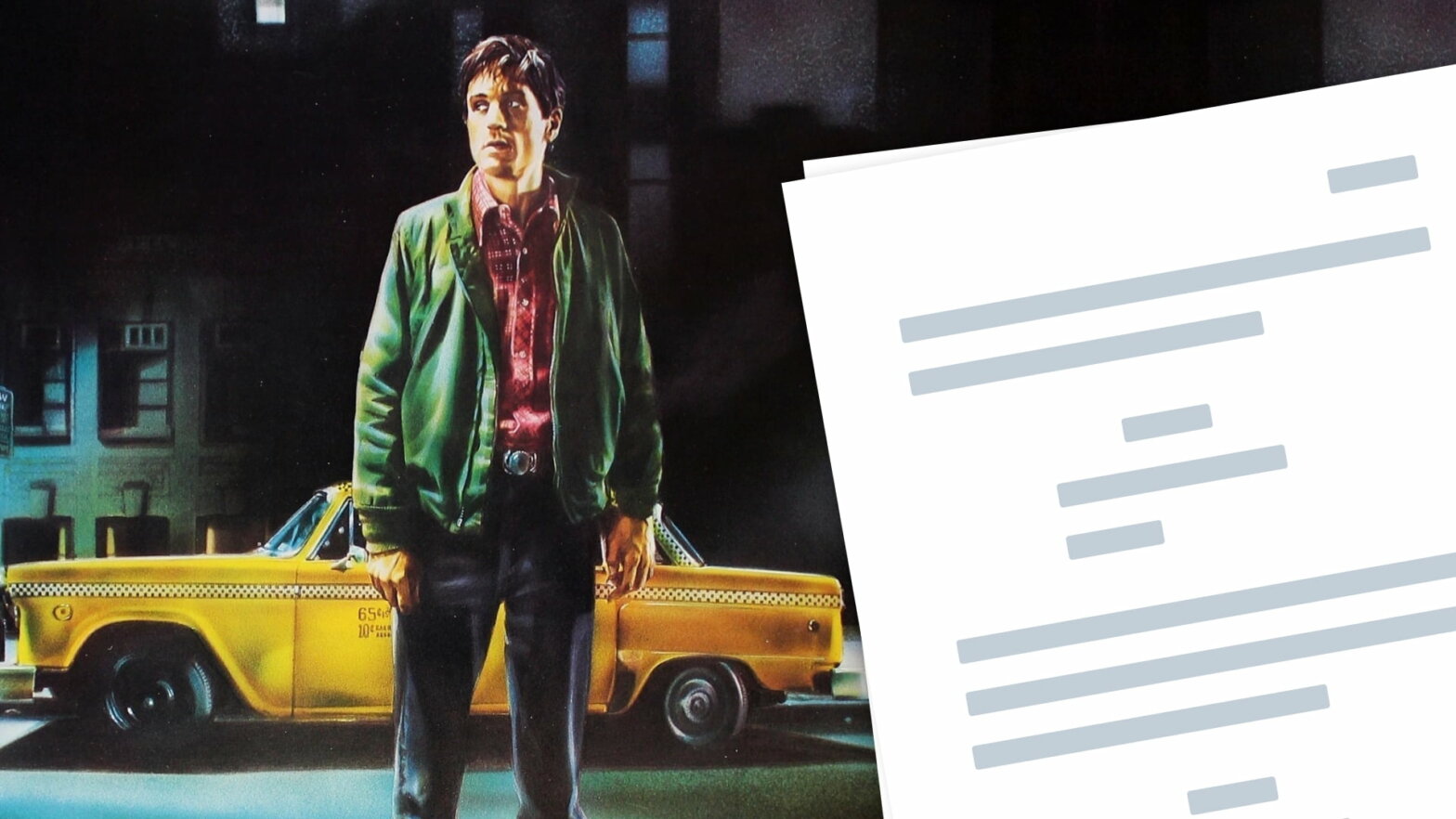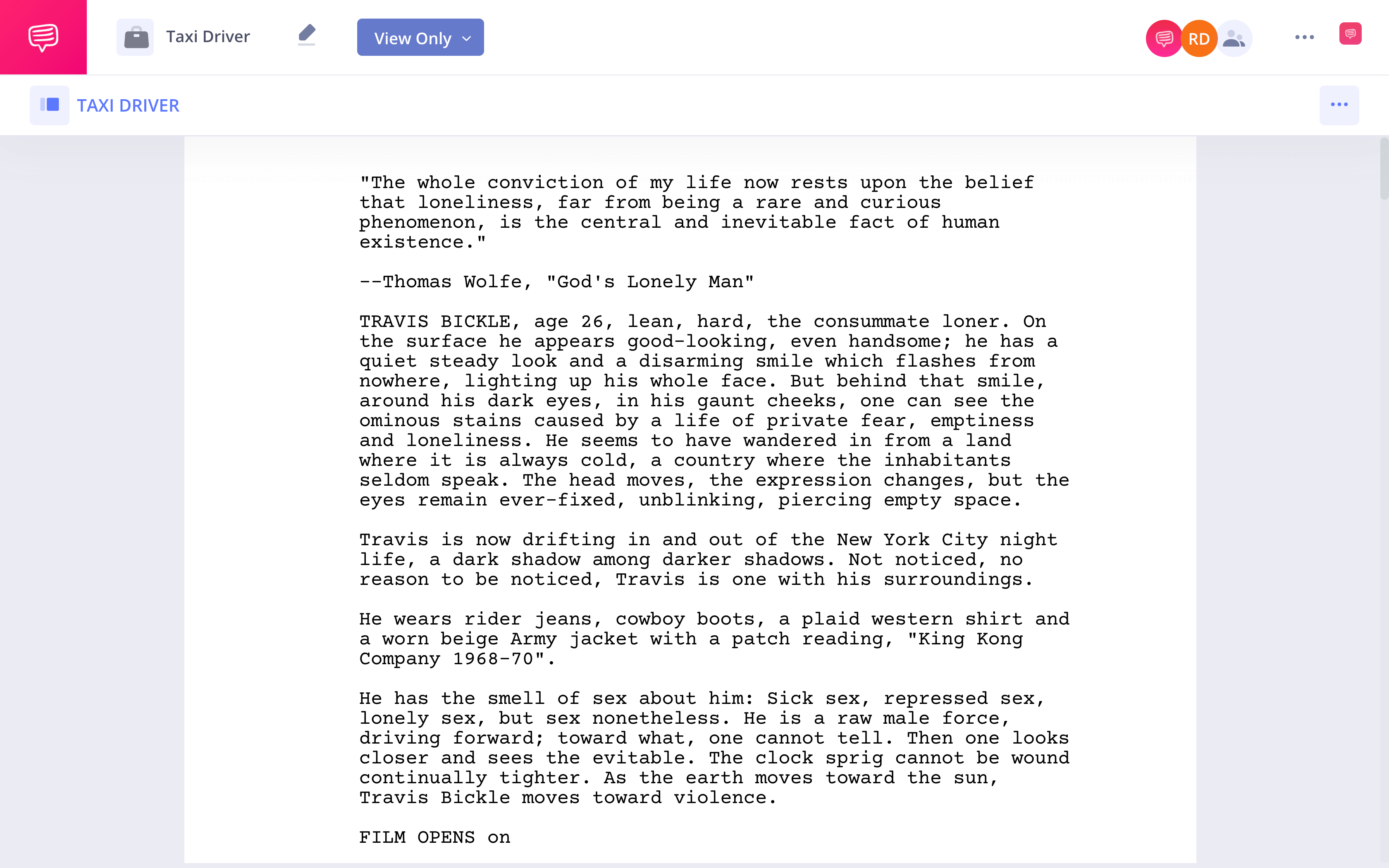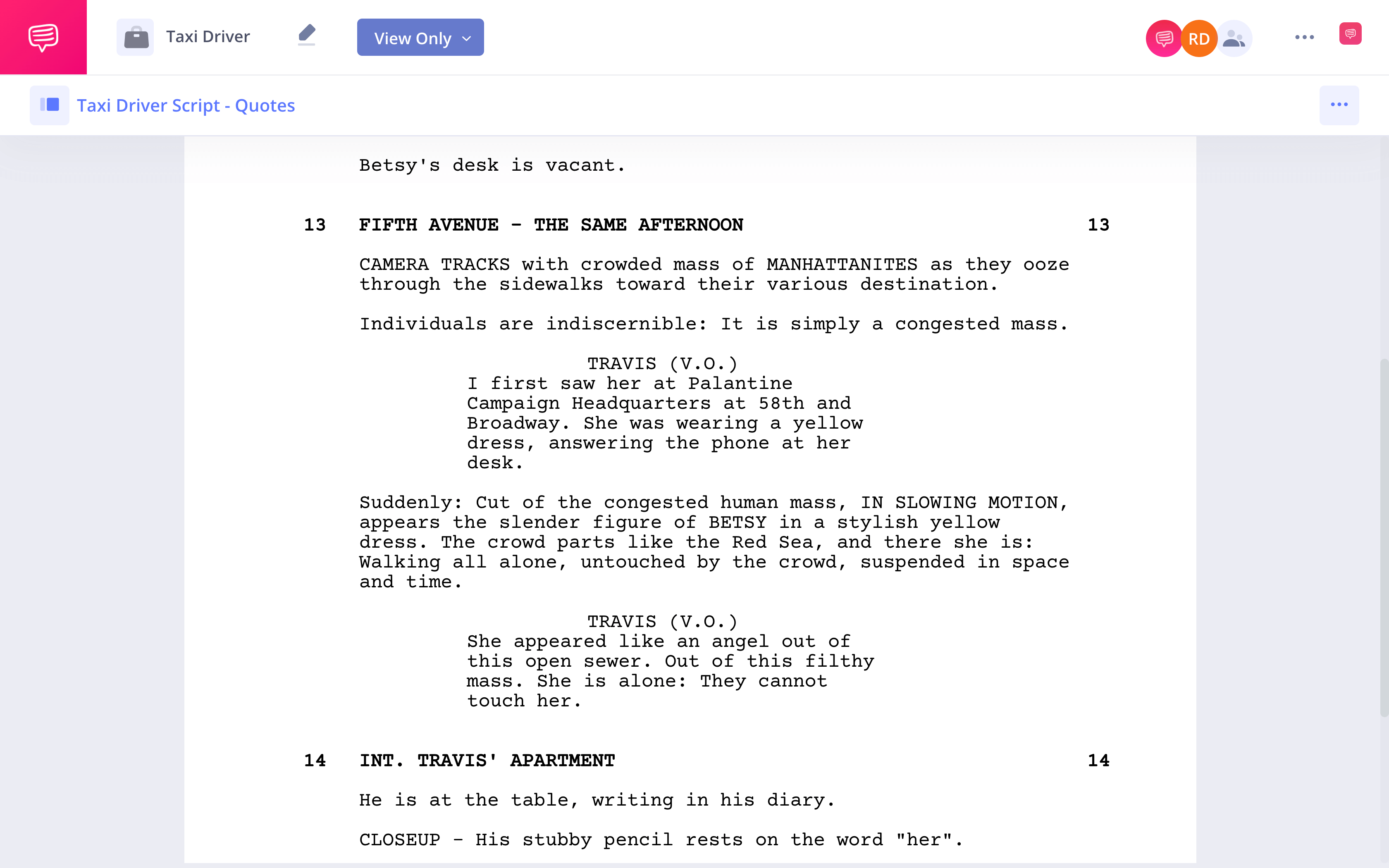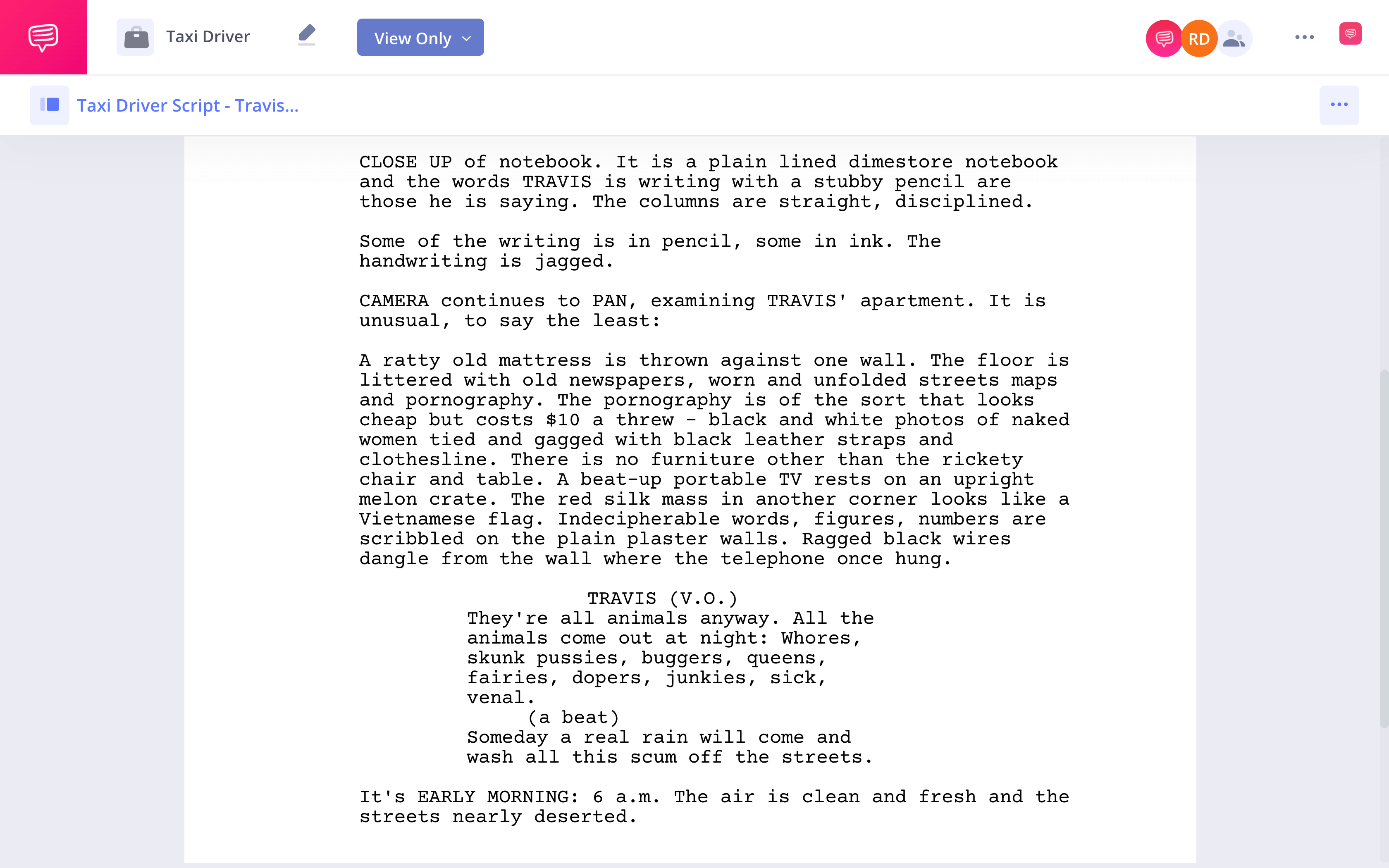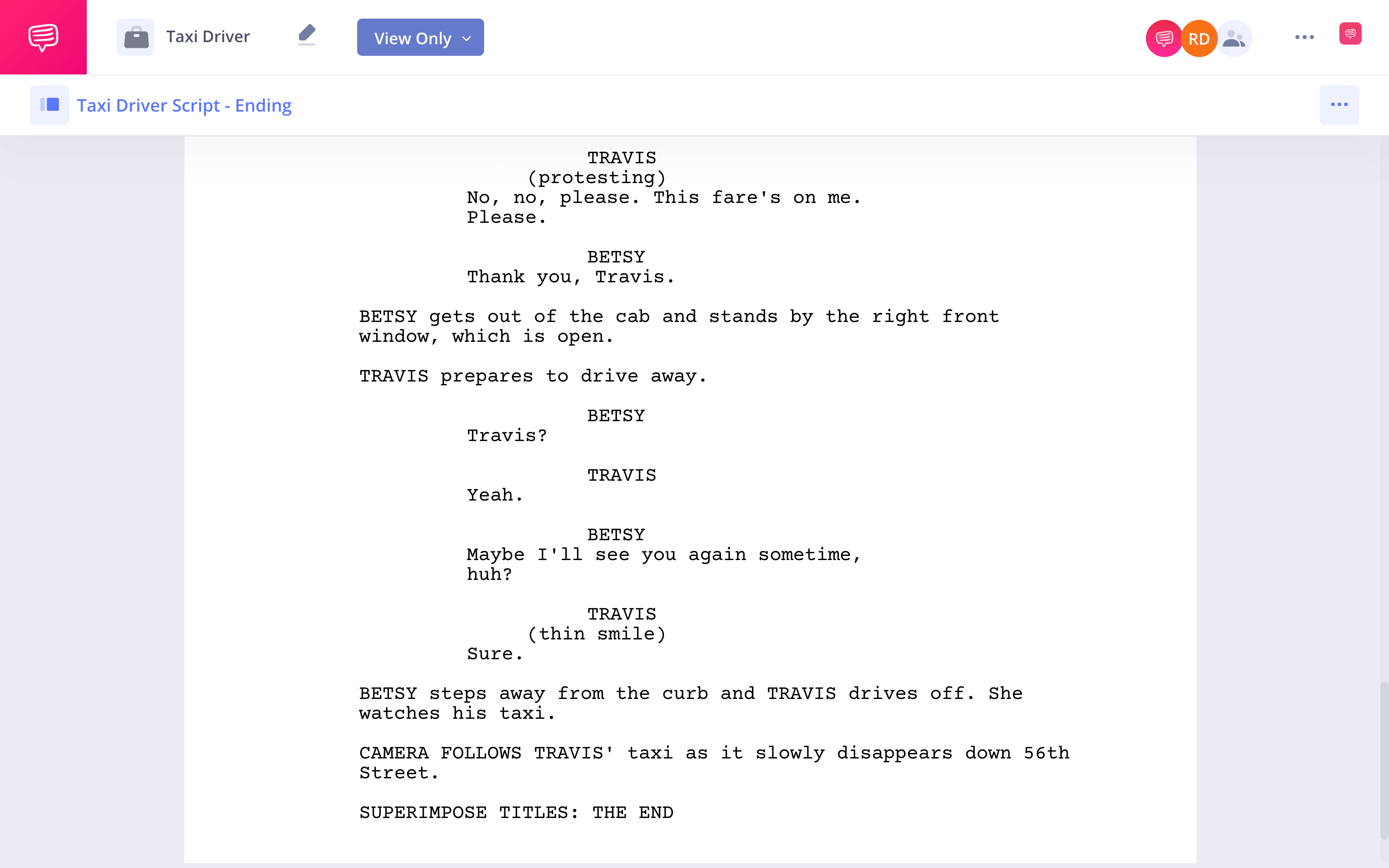The Taxi Driver script is one of the greatest screenplays ever written. Today, we’re going to break down why it’s great by looking at its plot, quotes, and allusions. By the end, you’ll know how Paul Schrader laid the groundwork for one of the best American films of all time and how it inspired his later work. “Who you talkin’ to? Me? Nobody else is here so you gotta be talking to me.” Download a copy of the Taxi Driver screenplay and follow along as we tear down an all-time classic.

WHO WROTE Taxi Driver?
Written by Paul Schrader
Paul Schrader is an American writer and director who is perhaps best known for writing the screenplays for Taxi Driver, Raging Bull, and The Last Temptation of Christ. In 2019, he was nominated for his first Academy Award – Best Original Screenplay – for First Reformed.
TAXI DRIVER PLOT
STRUCTURE OF THE TAXI DRIVER SCREENPLAY
Here is the story structure for the Taxi Driver screenplay:
Exposition
Travis Bickle, a 26-year-old war veteran, signs up to become a taxi driver because he “can’t sleep nights.”
Inciting Incident
Travis meets Betsy — an aide for presidential candidate Charles Palantine — and asks her on a date. She agrees.
Plot Point One
Travis takes Betsy to a diner for their first date. Curious about his enigmatic personality, Betsy agrees to go on a second date — but storms out when Travis takes her to a porno theater.
Rising Action
Travis’s psyche deteriorates under the stress of isolation. Meanwhile, New York City crumbles under the weight of crime and social upheaval.
Midpoint
Travis vows to change his life; to stop smoking, and to start working out. He also vows to clean up the filth of the city — alluding to a possible assassination of Charles Palantine. The midpoint comes to a head when Travis plays with his television set, rocking the melon crate holding it up — but when he pushes it too far, the TV comes falling down.
Plot Point Two
A young girl, Iris, attempts to flee via Travis’s cab, but is taken away by an older man. Sometime later, Travis discovers she’s a prostitute for a pimp named Sport.
Build Up
Travis plots to send Iris away from the city and kill Palantine.
Climax
At a presidential rally, Travis attempts to assassinate Palantine, but is cut off by the secret service.
Finale
Travis invades Sport’s brothel, killing the security, and liberating the prostitutes.
Denouement
Later, having recovered from the gun battle and taxiing again, Travis picks up Betsy, who says she hopes to see him again.
Taxi Driver Script Takeaway #1
Taxi Driver quotes are journal entries
If you look up the best Taxi Driver quotes, you’ll find that most of them are from Travis’s journal entries. That’s notable, if simply for the fact that it spits in the face of the commandment “thou shalt not use narration,” which some screenwriting teachers preach.
I don’t subscribe to that rule because it’s ludicrous – and neither does Taxi Driver writer Paul Schrader.
In fact, Schrader not only used narration generously in Taxi Driver but in its 2017 spiritual successor First Reformed as well.
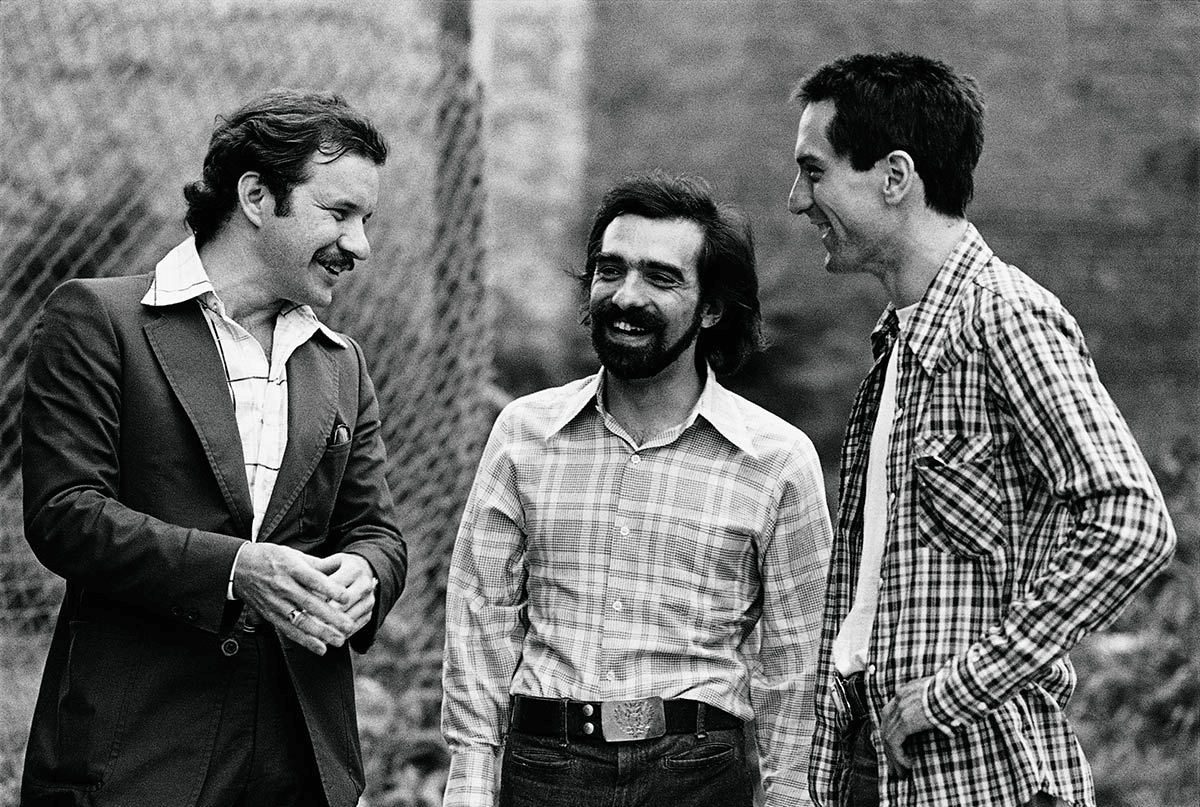
Paul Schrader, Martin Scorsese, and Robert DeNiro • Who wrote Taxi Driver
We imported the Taxi Driver screenplay into StudioBinder’s screenwriting software to take a closer look at its narration scenes. Click on the link below to see how V.O. (Voice Over) is properly formatted in screenplays.
Taxi Driver Screenplay PDF • Travis Narration Excerpt
Travis’s narrations allow us to see inside his deteriorating mind. They also serve as a blank canvas for the director to get creative with imagery.
Let’s take a look at the scene from the film to see how Martin Scorsese elevates the narration into gripping cinema.
Taxi Driver Clips • Travis Narration
Scorsese does a few brilliant things in this scene. First, he juxtaposes the carnal sound of porn with Bernard Hermann’s stirring score and Travis’s romantic monologue.
Second, he puts us in Travis’s point of view, bustling through the busy city street from a first person perspective.
Third, he utilizes rapid transitions to make us feel like we’re caught up in a fantasy. And of course, this scene contains two of the best Taxi Drive quotes: “I do not believe a person should devote his life to morbid self-attention, but should become a person like other people,” and “She is alone: they cannot touch her.”
Here are some of the other best Taxi Driver quotes:
- “I can’t sleep nights.”
- “One of these days, I’m gonna’ get organizized.”
- “All the animals come out at night: whores, skunk p*ssies, buggers, queens, fairies, dopers, junkies, sick, venal. Someday a real rain will come and wash all this scum off the streets.”
- “Listen you screwheads: here is a man who wouldn’t take it anymore, a man who stood up against the scum, the c*nts, the dogs, the filth--.”
- “Loneliness has followed me my whole life. Everywhere. In bars, in cars, sidewalks, stores, everywhere. There’s no escape. I’m God’s lonely man.
Of course, the most famous Taxi Driver quote of all actually comes from an improvised scene. Here is the scene breakdown and how Scorsese directed one of the most iconic scenes in film history.
You Talkin' to Me? • Subscribe on YouTube
Taxi Driver Script Takeaway #2
The world of Taxi Driver is underground
The world of Taxi Driver is one of the most gut-wrenchingly pessimistic film worlds ever made — it’s disgusting for a lack of a better word. Garbage lines the streets; junkies rob delis for slices of bread; and kids are pushed into prostitution. It’s awful.
So, why are we enticed by the world of Taxi Driver? Well, simply because it mirrors our own world. More specifically, it mirrors the part of our world that people in power work very hard to hide.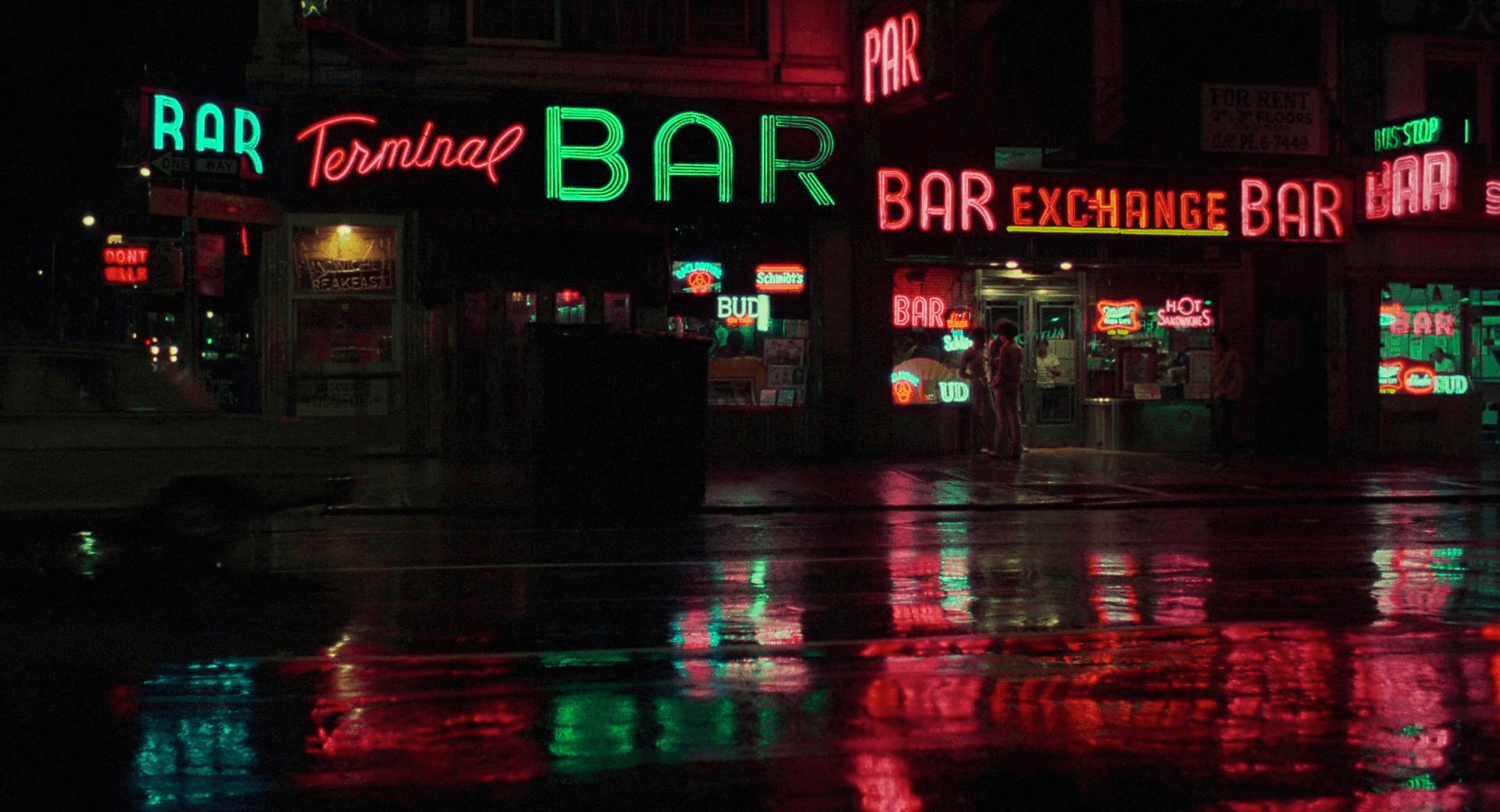
The world of Taxi Driver • Taxi Driver 1976 script
Many American city have tent cities, baseheads smoking in alleys, and prostitutes prowling the streets. But most of the time, they’re contained to densely-concentrated areas. The underground part of society is largely viewed with vitriol and condemnation, but the blind are able to disregard it with platitudes and signals of virtue.
Travis views every part of society with the same judgment. He constantly wishes someone would “wash the scum away,” which begs the question: could Travis be the one to wash the scum away?
Well, Ernest Becker argues in his Pulitzer Prize winning book The Denial of Death that “when the average person fails to be their own hero, then he bogs down in the failure of depression and terrible guilt.” And that’s precisely where we find Travis at the beginning of the story.
Read the excerpt below to see Travis’s world perspective.
All the Animals Come Out at Night • Taxi Driver movie script
Okay, so what can we infer from Travis’s didactic monologue? Well, it’s clear he’s pretty pissed off. He makes broad generalizations about people, (e.g., “they’re all animals”) and suggests that they shouldn’t exist. This nihilistic view is not natural — and it makes us think Travis is an unstable character; even if there is some truth to it.
Here’s the clip from the final cut.
Taxi Driver • All the Animals Come Out at Night
Up until this point, Travis resembles The Underground Man from Fyodor Dostoevsky’s Notes from Underground, invoking his philosophy of “I am a sick man… I am a spiteful man. I am an unattractive man. I believe my liver is diseased,” with his diatribe “the smell of flowers only made me sicker. The headaches got worse. I think I’ve got stomach cancer. I should not complain so.”
But at the midpoint of the script, Travis breaks free of his self-restraints and vows to “become his own hero” by ridding the world of filth. It’s perverse, but heroic. And in the end, he’s honored for it, even if only in his own mind.
Taxi Driver Script Takeaway #3
Taxi Driver ending, an anti-hero's dream
The dream of many anti-heroes is to become their own hero, no matter how perverse their methods for doing so may be. But being a hero isn’t the same for every character: being a hero for Walter White means becoming financially self-sufficient, being a hero for Tony Soprano means protecting his family, etc.
Being a hero for Travis Bickle means ridding the world of filth. Sounds somewhat noble. But what exactly is the filth Travis refers to? Well, the answer is: whatever he chooses.
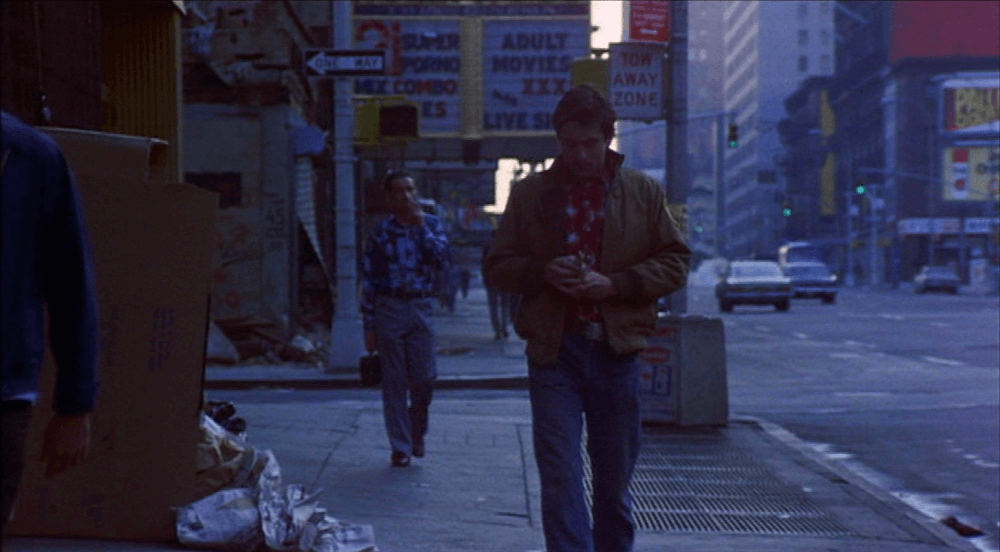
Travis Bickle • Taxi Driver script breakdown
Ah, yes, and thus, the nobility falls away. Travis interprets reality like a work of fiction. He envisions himself as a cowboy, shooting bad guys like Gary Cooper or John Wayne in the movies. But that’s not reality. But then again, as far as Taxi Driver is concerned, reality isn’t always what it seems.
Let’s take a look at the final scene of the Taxi Driver screenplay and consider this: are we witnessing “reality” or Travis’s interpretation of reality?
Taxi Driver Screenplay PDF
The Taxi Driver ending almost seems impossible – how did Travis break so far away from reality, yet return a hero? Well, maybe he didn’t return. Maybe, just maybe, he died in the shootout, and this hero fantasy was his final dream.
Watch the final scene yourself and let us know what you think.
Travis Becomes a Hero in Taxi Driver • Taxi Driver screenplay analysis
So, did Travis really become a hero? Or is it all in his head? The truth is I don’t think it matters. The Taxi Driver ending is what Travis wants it to be – that much is certain. He earns the respect of his colleagues, Iris’s parents, and perhaps most importantly, Betsy.
In the end, he achieves everything he wanted, yet we know it’s only a matter of time before his other side awakens.
Related Posts
Up Next
Read and download more scripts
Taxi Driver belongs on the Mount Rushmore of American screenplays. If you want to continue reading screenplays, we have similar titles like Scarface, Citizen Kane, and Casablanca in our screenplay database. Browse and download PDFs for all of our scripts as you read, write and practice your craft to become the next great screenwriter.
